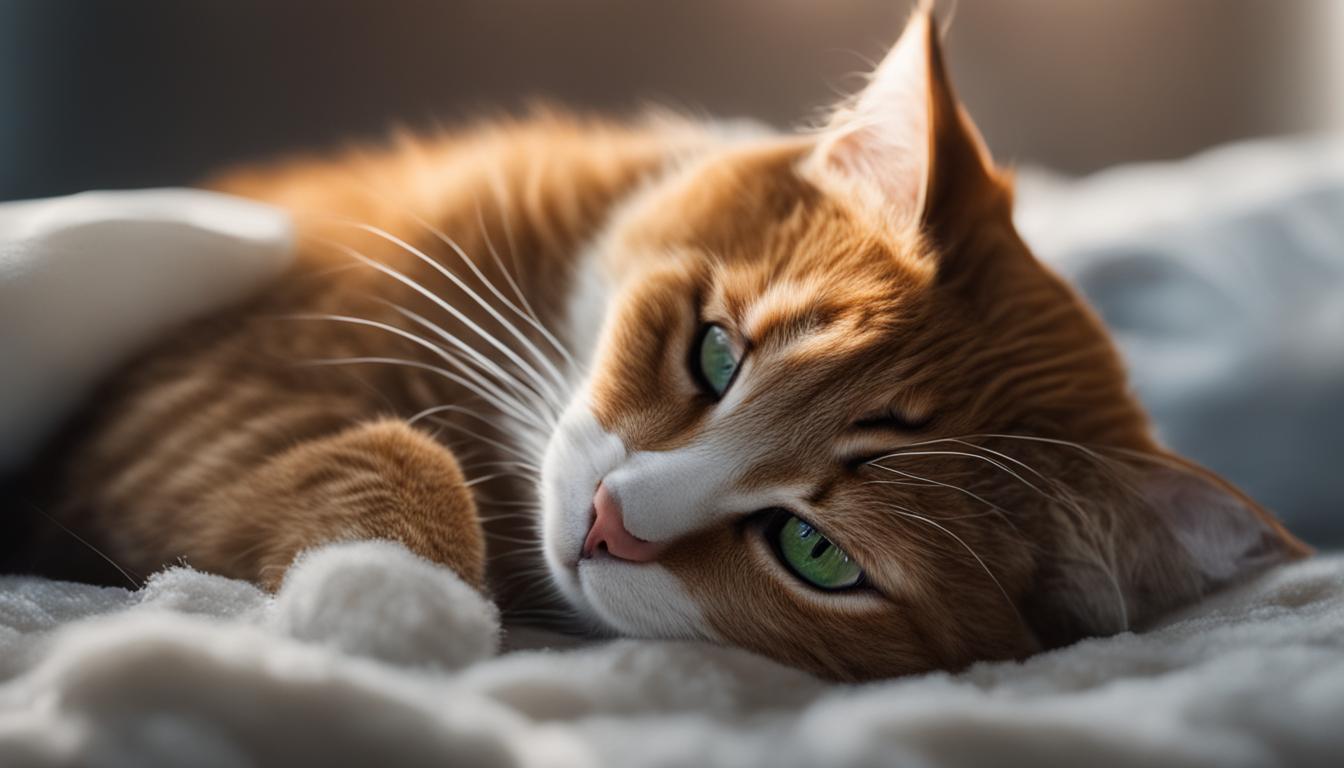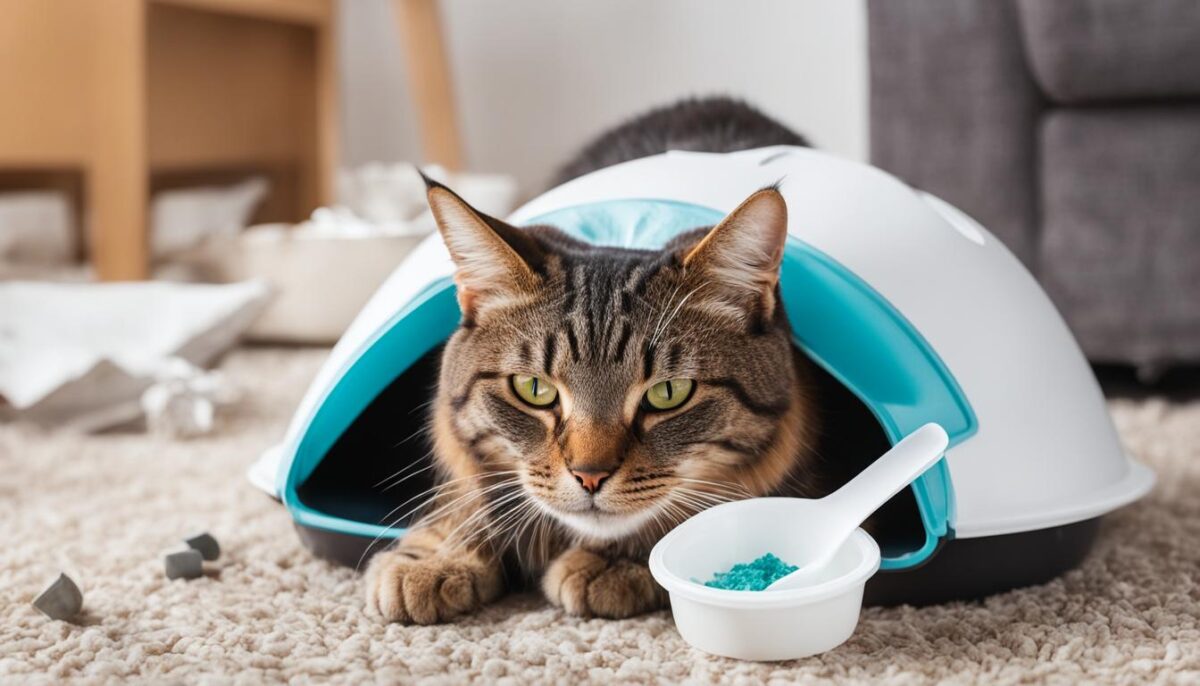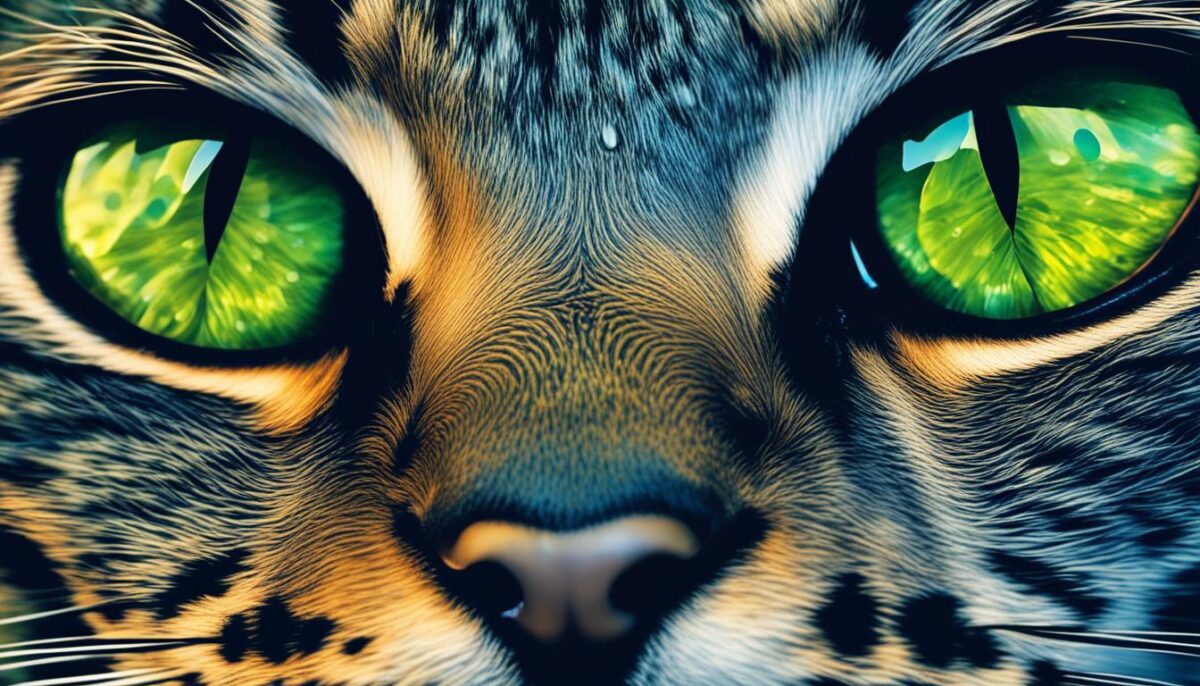Have you ever seen your cat sneeze or heard it cough? Just like you, cats can catch colds too. These colds are often called ‘feline colds’, and they can make your fluffy friend feel not so good. They might sneeze, have a runny nose or watery eyes, and want to sleep more. This happens because they’ve caught an upper respiratory infection, which is a fancy way of saying they have a cat cold. If your cat seems tired and isn’t playing like usual, they might have a cat cold. It’s important to watch for these symptoms so you can help your cat feel better.
Most of the time, cats will start to feel better all by themselves in a few days, almost like when you get over a cold. But sometimes, just like people, cats can get really sick from these colds and need extra care. So, if you see your cat sneezing and coughing more than just a little bit, or they seem very tired for many days, it’s smart to talk to a vet who knows all about cat health.
- Cats can catch colds, known as feline colds.
- If your cat sneezes, coughs, or has watery eyes, it might be a sign of a cat cold.
- Keep an eye on your cat for these symptoms to make sure they stay healthy.
- Most cats get better on their own, but some may need a vet’s help.
- Remember, a happy cat is a healthy cat, so give them lots of love!
Understanding Cat Colds and Their Symptoms
Just like people, cats can catch colds too. Have you ever seen your kitty with a runny nose or heard it sneeze? These could be signs that your cat has a cold. In this section, we’ll talk about what to look out for if you think your furry friend is feeling sick.
The Common Cold: Not Just for Humans Anymore
Cats can get colds, and the signs can be very similar to when humans feel unwell. Cat cold symptoms can include sneezing a lot which is called feline sneezing, having goopy stuff come out of their eyes or a runny nose, which we call discharge from eyes, and acting tired or not wanting to play, which shows lethargy in cats. Sometimes, your cat might even have a warmer body, known as fever in cats.
Signs Your Feline Friend Might Be Under the Weather
If your cat has a cold, it could feel so stuffed up that it can’t smell its favorite food and doesn’t want to eat. Just like how you might not want to eat when your nose is stuffy. This can make your cat sad because it loves to eat! But if you see these signs, it’s important to take care of your kitty so it can feel better.
There’s a big sneeze, and then you see it – goop in your cat’s eyes or a runny nose. Oh no! Your cat could have a cold. Let’s learn what to do if your cat is not its happy, playful self.
| Symptom | What It Looks Like | What You Can Do |
|---|---|---|
| Sneezing (Feline Sneezing) | Kitty sneezes, maybe again and again | Keep a close eye and make sure it’s not too often |
| Eyes or Nose Discharge | Wet or goopy stuff around eyes or nose | Gently clean with a soft, wet cloth |
| Tiredness (Lethargy in Cats) | Cat is not playing, just sleeping more | Let it rest, but if it lasts, talk to a vet |
| Warm Body (Fever in Cats) | Fur feels hot, cat might not want food | Time to see the vet if your cat feels warm |
Colds can spread between cats, but the good news is people can’t catch a cold from a cat. If you know what to look for, you can help your cat feel better soon. Remember, if your cat is acting sick, showing you all these signs, or just doesn’t seem right, a visit to the vet can help your cat get back to being its playful, cuddly self.
What Leads to a Cold in Cats?
If your cat is sneezing, it might have caught a cold. Just like people, cats get colds too. You might wonder, what causes these colds in cats? Well, there are two main feline viruses responsible for most of the sniffles and sneezes in our furry friends. These are the feline herpesvirus and the feline calicivirus. These viruses are very easy to catch, especially if a lot of cats live together like in a shelter.
When cats have these viruses, they may feel fine for a while. But if they feel stressed, the viruses can wake up and make them sick again. This means they might start sneezing or have runny eyes. These are some of the causes of cat colds you should know. If you think your cat feels sick, it’s important to take good care of them and maybe visit the vet.
Let’s take a quick look at these viruses:
- Feline Herpesvirus: This virus likes to hide in the body and can come out when the cat is stressed. It can cause sneezing, runny eyes, and other cold-like symptoms.
- Feline Calicivirus: This virus is also very catchy among cats. It can make your cat’s mouth sore and lead to cold symptoms like a runny nose.
Remember, a happy cat is a healthy cat. So, try to keep your cat’s life stress-free to help prevent these viruses from causing a cold.
Can Cats Get Colds: The Role of Viruses
When your cat starts sneezing and coughing, you might wonder if it’s something like the colds people get. In fact, two tricky germs are often to blame – feline herpesvirus and feline calicivirus. These are contagious cat viruses that are pretty common among kitties. They are sneaky, too, because they can hide in your cat’s body and pop up later, especially if your kitty gets stressed out.
Feline Herpesvirus: A Common Culprit
Feline herpesvirus is like the cold sore virus that people can get. It can come back over and over whenever your cat is stressed. Imagine that! After your cat feels better, the virus digs in and waits for the next time it can come out and cause trouble.
Feline Calicivirus: Contagious and Concerning
Now, feline calicivirus is another germ that causes colds in cats, and it spreads super easily. Cats playing or sharing food and water dishes can pass it around. This virus can make your cat’s mouth sore too, so they might not want to eat.
Luckily, there’s a way to help your cat fight these viruses – kitten vaccines! These are shots that your cat can get when they’re little to help their body learn how to beat the germs. The shots might not stop every cold, but they can make them less bad. It’s like wearing a raincoat; you might get a little wet, but you won’t be soaked!
Here, check out this super important info about these viruses and the vaccines that help fight them:
| Virus | Spread By | Common Signs | Vaccine Available? |
|---|---|---|---|
| Feline Herpesvirus | Close contact | Sneezing, runny eyes | Yes, it helps! |
| Feline Calicivirus | Sharing dishes, playing | Sore mouth, not eating | Yes, get those shots! |
So, if you have a kitty, it’s a good idea to talk to your vet about getting them these kitten vaccines. That way, your fuzzy friend has a better chance at bouncing back fast from those cold-like symptoms!
Diagnosing a Cold in Your Cat
When your cat seems a little under the weather, sniffling and sneezing more than usual, it might be time to check if they’ve caught a cold. Cats can get colds just like people do, and figuring out what’s making your kitty sick is the first step to getting them feeling better.
The Importance of a Thorough Vet Check-Up
Heading to the veterinarian is a smart move. Your vet can take a good look at your cat and ask you about their health history. By doing this, they get clues about what might be causing your furry friend’s sniffles. A vet visit is really helpful for diagnosing cat colds.
Recommended Diagnostic Tests for a Feline Cold
Veterinarian examinations sometimes need more than just a check-up. To know exactly what’s bothering your cat, your vet might want to do some tests. They could ask for blood tests for cats to see how your cat’s body is handling the illness. They might also use something called an upper respiratory PCR panel. This is a special kind of test that can find the tiny germs causing the cold.
Remember, just like when you catch a cold and need to rest and drink plenty of fluids, your cat needs extra care too. If your vet finds something in the tests, they will know the best way to help your kitty get better. That might mean some medicine or just some quiet time at home to rest. Listen to what the vet says, and soon your cat will be back to their playful, purring self!
How to Nurse Your Cat Back to Health
When your furry friend is feeling under the weather with a cold, your loving care can make a big difference. Just like when people get colds, comfort at home goes a long way in helping your cat feel better.
At-Home Comforts for Your Sneezing Companion
Creating a cozy environment is one key step in treating cat colds. Make sure your cat has a warm, quiet corner to snuggle up in. Using humidifiers for cats can help ease their breathing and reduce the discomfort from congestion.
- Maintain a comfortable room temperature
- Keep fresh water available to help with hydration
- Gently wipe away any eye or nose discharge with a soft cloth
- Consider home remedies for cat colds such as a warm compress to help clear nasal passages
Caring for a sick cat can also include offering their favorite food to encourage eating, even if their sense of smell might be impacted by the cold. Patience and extra snuggles can do wonders for their spirits.
When is Medical Treatment Necessary?
Sometimes, a cat’s cold can become more serious, and they might need help from your vet. If you notice any signs like them not eating for a long time or having trouble breathing, they may need antibiotics for feline respiratory infections or more specific care. Always talk to a vet before giving any medicine.
- Monitor for symptoms worsening, like persistent coughing or wheezing
- Watch for changes in behavior that might show they’re in pain or very uncomfortable
- Make sure they eat something; if not, your vet should be contacted
Follow your vet’s advice closely and give all medicines as directed. Remember, a cuddle and a comfy blanket can make a big difference in your cat’s day!
Recovering from a Feline Upper Respiratory Infection
When your kitty has been under the weather with a cold, you want them to feel better fast. But getting over a cat cold, or a feline upper respiratory infection (URI), takes a bit of time and lots of love. Your furry friend needs about a week to ten days to bounce back. This is when feline health monitoring becomes super important to help avoid any complications from cat colds.
Monitoring Your Cat’s Recovery Journey
Keep an eye on how your cat is doing each day. It’s like being a detective looking for clues that your cat is getting better. If your kitty is up and moving more, eating well, and has less sneezing, that’s great news! These are signs they are on the path to feline URI recovery. Remember, you are the best person to notice these changes because you know your cat better than anyone else.
Preventing Further Health Complications
While caring for a sick cat, you can help your pet to avoid other icky health problems. You can do things like making the air moist with a humidifier, which helps your cat breathe easier. Also, keeping their space calm and quiet makes a big difference. Cats really like peace and quiet when they’re not feeling well—just like us!
But if your little buddy doesn’t seem to be getting better or if they start acting very sick, then it’s time to call the vet. We don’t want any bad sicknesses like pneumonia to sneak up on them. Your love and attention are so important to help your cat heal from a cold!
Conclusion
When it comes to cat cold prevention, a little knowledge and care go a long way. Just like people, cats can catch colds, but you can help keep your furry friend feeling paw-some! Make sure your pets get their shots to guard against germs. Keep their home cozy and don’t let stress make them feel ruffled. A happy cat is a healthy cat!
If your kitty starts sniffing and sneezing, keep a close eye on them. Remember, if your pet seems sicker after a few days or isn’t getting better, it’s time to call the vet. Quick action can stop a simple sniffle from turning into something scarier. Keeping up with feline wellness means your cat will thank you with purrs and cuddles!
By understanding cat colds, you’re taking a big step in looking after your pet’s health. If you’re ever unsure, your vet is there to help. With your care and attention, your kitty can bounce back to their playful, loving self in no time!
FAQ
Can cats really catch colds?
Yes, cats can indeed catch colds, which are caused by viruses similar to those that cause human colds. These colds are also known as upper respiratory infections in cats.
What are the typical symptoms of a cat cold?
Symptoms of a cat cold may include sneezing, coughing, discharge from the eyes or nose, lethargy, and sometimes a fever. Your cat might also lose their appetite if they’re experiencing severe congestion.
Why does my cat sneeze and have a runny nose?
These are common symptoms of a cat cold, primarily caused by the feline herpesvirus or the feline calicivirus, which can cause upper respiratory infections in cats.
Are cat colds contagious to other cats or humans?
Cat colds are highly contagious among cats, especially in environments with many cats living closely together. However, these viruses cannot be transmitted to humans.
How are cat colds diagnosed?
Veterinarians typically conduct a thorough physical exam and review the cat’s medical history. They might also suggest diagnostic tests such as blood tests, upper respiratory PCR panels, and chest X-rays to rule out pneumonia or other conditions.
What can I do at home to help my cat recover from a cold?
Home care can include providing a humid environment, ensuring the cat has a quiet and stress-free space, and using steam therapy to help soothe respiratory symptoms. Always follow your veterinarian’s guidance.
When should I take my cat to the vet for a cold?
If your cat’s symptoms worsen or don’t show improvement after four days, it’s essential to consult a vet. Any indication of breathing difficulty, refusal to eat, or other severe symptoms warrants immediate medical attention.
Can cat colds be prevented?
While not entirely preventable, the risk of cat colds can be reduced through vaccination, good hygiene, and maintaining a low-stress environment for your cat. Regular check-ups with a vet also play a crucial role in feline wellness.
How long does it usually take for a cat to recover from a cold?
A healthy cat will typically recover from a cold in about 7-10 days. However, recovery could take longer, and complications may arise, so it’s vital to monitor your cat’s health closely and support them through their recovery.
Is it necessary to give my cat medicine if it has a cold?
While many cat colds will resolve on their own, antibiotics may be required for secondary bacterial infections. Your veterinarian will determine the best treatment plan after a thorough examination.


